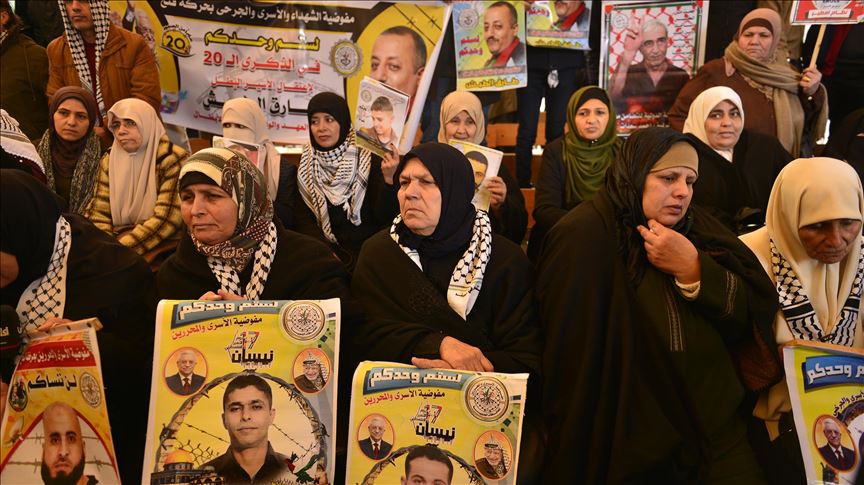Coronavirus outbreak worries families of Palestinian prisoners
5,000 Palestinians, including dozens of women and children, are languishing currently in Israeli jails
 file photo
file photo
RAMALLAH
As the state of emergency continues in the West Bank and Israel in the wake of the outbreak of coronavirus, Palestinians are worried about their relatives held in Israeli prisons.
The fears of an outbreak of the virus in the prisons were compounded by reports that an inmate at the Ashkelon prison was removed as a precaution after being examined by an Israeli doctor who suspected him of being infected.
According to the Palestinian Prisoner Society (PPS), 19 out of 35 prisoners detained with the inmate in the same department were immediately isolated on Friday.
"We have official confirmation from the lawyers that the isolation has ended and the situation is stable there," Spokesman for the PPS Amany Sarahneh told Anadolu Agency on Monday.
"However, we are still concerned about the situation in the prisons because of the lack of precaution measures there," she added.
In Al-Maskobiya prison in Jerusalem, Israeli authorities have isolated 100 prisoners after an officer was suspected of contracting the virus.
Authorities told a PPS lawyer that the quarantine has ended as the tests were negative, Sarahneh said.
The group said 200 Palestinian prisoners are suffering from chronic diseases, which largely threatens their lives if the virus spreads in prisons.
According to Palestinian authorities, 5,000 Palestinians, including women and children, are currently held in Israeli detention facilities.
Israeli Internal Security Minister Jela'ad Ardan has instructed the prison administration to prevent visits. The International Committee of the Red Cross (ICRC) told Palestinian families that there will be no visits this month.
Israeli authorities have confirmed 214 cases of coronavirus so far in the country.
"My husband Osayd Abu Khudair is in Ofer Prison, we cannot visit him these days,” Hebron [Al-Khalil] resident Doha Hoor, 27, told Anadolu Agency.
“I am worried about him. If one case is diagnosed in prison this means an awful possibility! Osayd will not see his only daughter this month. This makes me worry harder!"
In 2017, Abu Khudair was slapped for five years in prison for allegedly taking part in pro-Hamas activities in the occupied West Bank.
Release prisoners
Palestinian Prime Minister Mohammad Shtayyeh on Saturday asked the Israeli authorities to immediately release the Palestinian prisoners languishing in the Israeli jails.
Shtayyeh asserted that the release should include child prisoners and those suffering from chronic diseases.
Sahel Nafaa, 54, from Jenin said the "The Israeli authorities do not care about our sons -- they care about the prison crews...,"
"They worry about the spread of the coronavirus among the jailers, not prisoners. My son, Azmi, who was injured when was arrested, and his fellows have no sterilization supplies in the prison,"
Nafaa called on the Israeli authorities to immediately release the Palestinian prisoners, including his son.
"Their real place should be their homes, not in prison," asserted Nafaa.
Israel's prison service has started preparing Sahranem Prison in the Negev desert to accommodate diagnosed cases among prisoners.
Sarahneh told Anadolu Agency earlier that the prison service has reduced the number of cleaning supplies that were given to the Palestinian prisoners.
"The medical negligence in prisons has exacerbates our concerns if the virus spreads there," she said, noting that her group is "contacting the ICRC to assume its responsibility and intensify efforts to secure the necessary measures for the prisoners’ safety."
Infections were reported in the West Bank’s holy city of Bethlehem after a group of Greek tourists stayed at a hotel there.
The number of diagnosed cases in West Bank rose to 38 on Friday -- 37 in Bethlehem and one in Tulkarm.
The Palestinian Ministry of Health said 4,000 people are subject to house quarantine, in addition to 60 in quarantine by the ministry.
The government completely closed Bethlehem to prevent the spread of the virus to other areas.
As a safety precaution, all schools and universities in the West Bank are temporarily closed and e-education has been adopted as an alternative to maintaining the continuity of the educational process until the end of emergency measures.
The government closed public places where gatherings take place, such as restaurants, wedding halls, and entertainment venues.
The Ministry of Religious Affairs asked the faithful to pray at home to avoid congregations.









